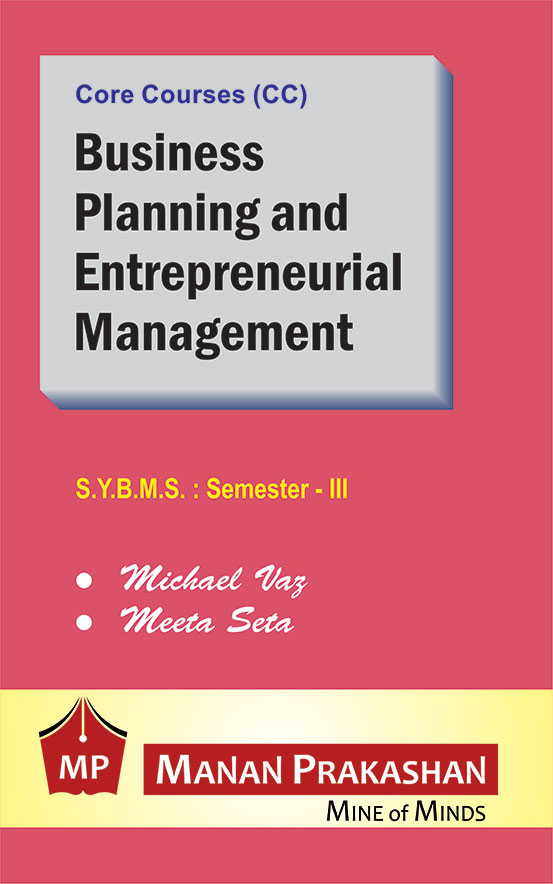Description
Business Planning and Entrepreneurial Management
SYBMS Semester III
Syllabus
1. Foundations of Entrepreneurship Development (15 Lec.)
♦ Foundations of Entrepreneurship Development : Concept and Need of Entrepreneurship Development
Definition of Entrepreneur, Entrepreneurship,
Importance and significance of growth of entrepreneurial activities
Characteristics and qualities of entrepreneur
♦ Theories of Entrepreneurship :
Innovation Theory by Schumpeter & Imitating
Theory of High Achievement by McClelland
X – Efficiency Theory by Leibenstein
Theory of Profit by Knight
Theory of Social change by Everett Hagen
♦ External Influences on Entrepreneurship Development : Socio-Cultural, Political, Economical, Personal.
Role of Entrepreneurial Culture in Entrepreneurship Development.
2. Types and Classification of Entrepreneurs (15 Lec.)
♦ Intrapreneur – Concept and Development of Intrapreneurship
♦ Women Entrepreneur – concept, development and problems faced by Women Entrepreneurs, Development of Women Entrepreneurs with reference to Self Help Group
♦ Social entrepreneurship – concept, development of Social entrepreneurship in India. Importance and Social responsibility of NGO’s.
♦ Entrepreneurial development Program (EDP) – concept, factor influencing EDP. Option available to Entrepreneur. (Ancillarisation, BPO, Franchise, M&A)
3. Entrepreneur Project Development & Business Plan (15 Lec.)
♦ Innovation, Invention, Creativity, Business Idea, Opportunities through change
♦ Idea generation – Sources – Development of product /idea
♦ Environmental scanning and SWOT analysis
♦ Creating Entrepreneurial Venture – Entrepreneurship Development Cycle
♦ Business Planning Process – The business plan as an Entrepreneurial tool, scope and value of Business plan
♦ Elements of Business Plan, Objectives, Market and Feasibility Analysis, Marketing, Finance, Organization &Management, Ownership
♦ Critical Risk Contingencies of the proposal, Scheduling and milestones
4. Venture Development (15 Lec.)
♦ Steps involved in starting of Venture
♦ Institutional support to an Entrepreneur
♦ Venture funding, requirements of Capital (Fixed and working) Sources of finance, problem of Venture set-up and prospects
♦ Marketing : Methods, Channel of Marketing, Marketing Institutions and Assistance
♦ New trends in entrepreneurship






Reviews
There are no reviews yet.